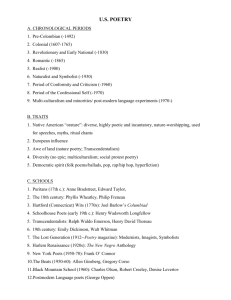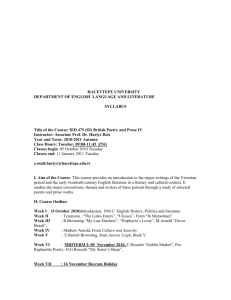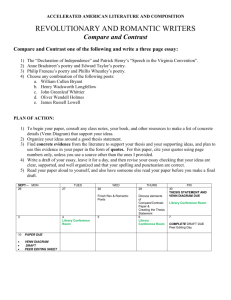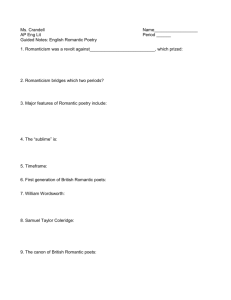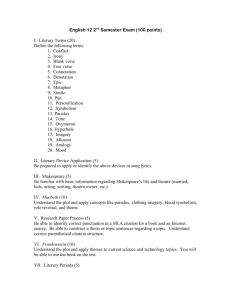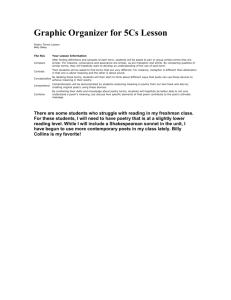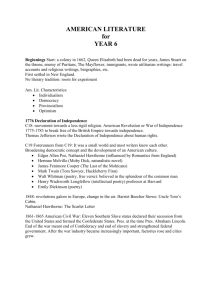The Romantic Period - Henry County Schools
advertisement
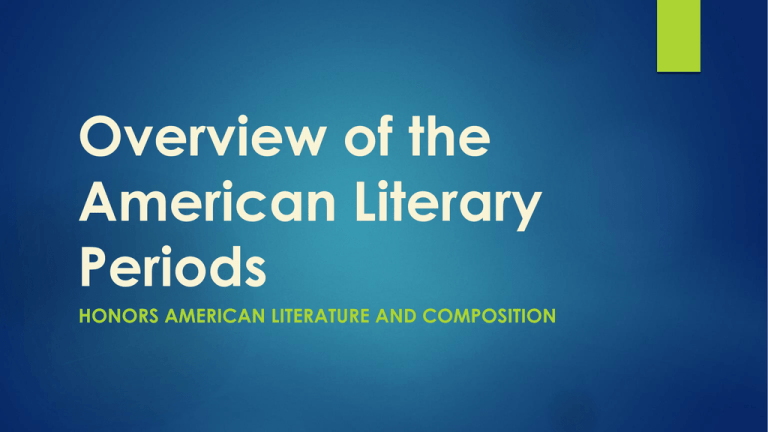
Overview of the American Literary Periods HONORS AMERICAN LITERATURE AND COMPOSITION Native American Literary Period 30,000—1730 A.D. Characteristics Focus on the common origin of all things (birth, death, rebirth, changing seasons) Tribal traditions and rituals Respect for nature Animals can be characters (interchangeable with humans) Uses similes, metaphors Mostly oral (oral tradition) Some written accounts Ceremonial songs and prayers Types of Literature Mostly oral (oral tradition) Some written accounts Ceremonial songs and prayers Writers and Their Works Walum Olum (Delaware)— explanation of the natural world Navajo Origin Legend (Navajo) Spring Song (Chippewa) Historical Events Settlement of four to six million Indians into various tribes on American continents. Columbus discovers America Cortez conquers the Aztecs in Mexico Iroquois confederacy established to stop warfare among the Five Nations Puritan Literary Period 1620—1780 Characteristics Miracle of grace cleanses envy, vanity, and lust (allows one to love God and all creation) Plainness in all things. Stress on simple forms of worship without decoration or ornamentation The best writing is simple and clear; never clever or ornate (no metaphors) God chose (the Elect) the Puritans to bring true Christianity to America Types of Literature Sermons Diaries/Journals Narratives (of captivity) Poetry Letters (early explorers used hyperbole) Fiction drama was forbidden (no plays) Bible was the only book read Writers and Their Works Anne Bradstreet “Upon the Burning of our House” Cotton Mather (wrote a book on evidence against witches) Edward Taylor “Huswifery” Jonathan Edwards “Sinners in the Hands of an Angry God” Historical Events Pilgrims landed at Plymouth Rock Massachusetts Bay Company brings Puritans to New England Salem Witch Trials Harvard University founded First newspaper Colonial Literary Period 1750—1800 Characteristics Also known as the “AGE OF ENLIGHTENMENT” High regard for reasoning and scientific observation Strong belief in human progress Freedom from restrictive laws and government Little interest in religion or the hereafter Moderation and self-control in all things Stress on elegant, ornate style of writing Types of Literature Political writings Almanacs Essays Aphorisms Magazines Newspapers Autobiographies Speeches Poetry Writers and Their Works Benjamin Franklin—Poor Richard’s Almanac and Autobiography Phillis Wheatley—”On Being Brought from Africa to America” Thomas Paine—Crisis No. 1 (prose in defense of the Revolution) Patrick Henry—Speech to the Virginia Convention Historical Events Benjamin Franklin’s kite experiment Colonists resist new Stamp Act Thomas Jefferson writes the Declaration of Independence Revolutionary War George Washington becomes first president Romantic Literary Period 1800—1860 Characteristics The Romantic Period was extremely popular in literature. In America, Romantic literature was defined by the Five “I’s” Inspiration Intuition Innocence Imagination Inner experience Writers and Their Works William Cullen Bryant: “Thanatopsis” (poem) Washington Irving: “Rip Van Winkle” (short story) James Fenimore Cooper: The Last of the Mohicans (novel) Fireside Poets Longfellow Bryant Lowell Holmes Whittier Historical Events War with England Westward Expansion Mexican War California gold rush Civil War Gettysburg Address The Romantic Writers High regard for inner feelings and emotions Reverence for the imagination Nature inspires us to the highest ideals Interest in the past Use of language of the “common” people Romantic Writers Stressed… The innate goodness of man Favored the individual over the group Revered nature Rebelled against political authority Revered intuition over logic/reason What were the Fireside Poets? First group in American poets to rival British poets in popularity in either country. Notable for their education, the lasting power of lines, themes and political interests. Preferred conventional poet forms over experimentation. Often used American legends and scenes of American life as their subject matter. Paid attention to rhyme and cadence which made their poems popular for memorization and recitation. Who were the Fireside Poets? Henry Wadsworth Longfellow William Cullen Bryant James Russell Lowell Oliver Wendell Holmes John Greenleaf Whittier Lasting Impact of the Fireside Poets Longfellow remained the most popular American poet for decades, but after Poe criticized his work, he was all but ostracized from the poetry community. Lowell and Whittier were outspoken liberals and abolitionists. Longfellow remains the only American poet to be immortalized by a bust in Westminster Abbey’s Poet’s Corner. They took on causes in their poetry, such as the abolition of slavery, which brought the issues to the forefront. American Renaissance Transcendentalism, Anti-Transcendentalism, Gothic Literature 1840—1860 Characteristics (Note the overlap in time period with Romanticism -- some consider the antitranscendentalists to be the "dark" romantics or gothic) Transcendental: Truth beyond the physical world Happiness through individualism/self-reliance Reverence for nature Anti-Transcendental: Critical of transcendentalists Human nature a mix of good and evil Used symbolism to great effect Sin, pain and evil exist Types of Literature Essays Novels Short Stories Poetry Writers and Their Works Edgar Allen Poe “The Fall of the House of Usher” Nathaniel Hawthorne The Scarlett Letter Herman Melville Moby Dick Henry David Thoreau Walden Ralph Waldo Emerson On SelfReliance Harriet Beecher Stowe Uncle Tom’s Cabin Aphorisms of Emerson and Thoreau Historical Events War between U.S. and Mexico California gold rush First Women’s Rights Convention The anti-slavery novel Uncle Tom’s Cabin by Harriet Beecher Stowe is published Realism, Regionalism, Naturalism Literary Period 1850—1900 Characteristics—Realism Expression of life as it is actually lived Factual description of ordinary characters and events rather than larger than life heroes in imagined settings Subject matter often consists of factories, slums, workers, bosses, criminals, social outcasts Characteristics—Naturalism Heredity, environment and economics determine one’s destiny Humans are at the mercy of brutal forces beyond their control Influence of scientific method (a writer carefully gathers facts about human experience and then draws conclusions) Types of Literature Essays Stories Poetry Novels Songs Speeches Letters Writers and Their Works Walt Whitman “Song of Myself” Bret Harte “Outcasts of Poker Flat” Jack London Call of the Wild Mark Twain Huckleberry Finn Emily Dickinson (poetry) Stephen Crane Red Badge of Courage Historical Events Civil War and post-Civil War period Thomas Eidson invents the light Statue of Liberty dedication in New York Wright brother’s first airplane in flight Formation of NAACP World War I Modernism and Post-Modernism Literary Periods 900—1950 Characteristics Opposition to dehumanizing trends in modern life Dignity of people in spite of great challenges Short stories with a more open form that stress mood and character rather than plot Loss of idealism due to war, industrialization, political changes (search for new sources of hope) Characteristics, continued Experimental forms of poetry such as free verse (irregular and/or unrhymed verse lines) and symbols that suggest meaning and moods. Imagist poets like William Carlos Williams and H.D. Lawrence wrote short poems with sharp and precise images. Confessional poets explored their personal conflicts with great honesty and frankness (Robert Lowell, Sylvia Plath, Anne Sexton) Characteristics, continued Harlem Renaissance helped to preserve African-American heritage and raise awareness of Black culture and concerns Langston Hughes Jean Toomer Countee Cullen Types of Literature Stories Novels Poetry Travel Books Songs Negro Spirituals Writers and Their Works F. Scott Fitzgerald The Great Gatsby John Steinbeck The Grapes of Wrath John Steinbeck Of Mice and Men Alice Walker The Color Purple Thornton Wilder Our Town Langston Hughes “The Weary Blues” William Carlos Williams (poetry) H.D. Lawrence Historical Events Stock Market Crash Great Depression Japanese bomb Pearl Harbor World War II Segregation of public schools becomes illegal Resurgence of the Klan
